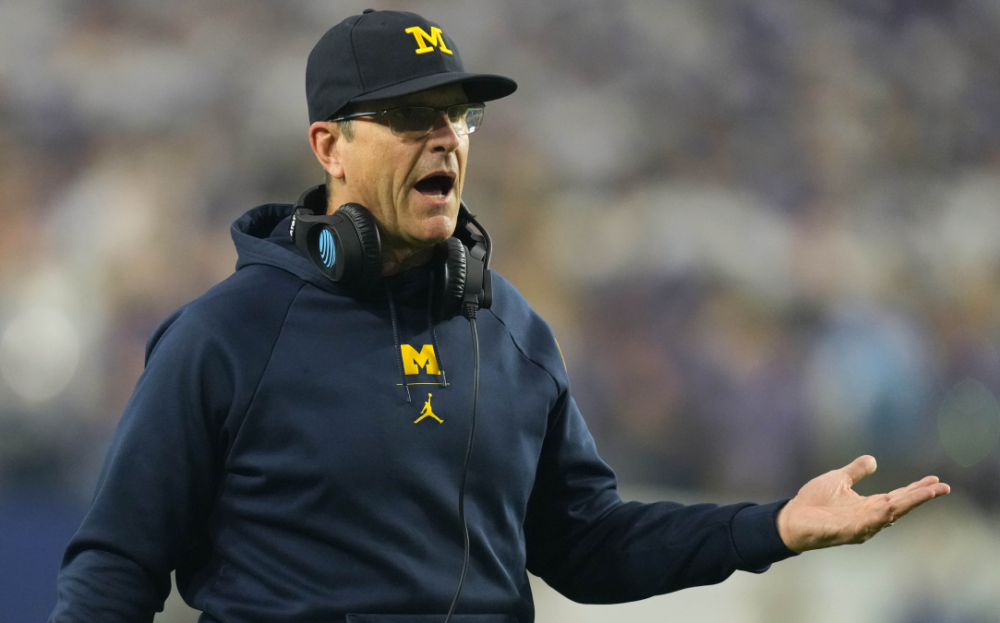
26 July, 2023
Jim Harbaugh, the head coach of Michigan, and the NCAA are negotiating a resolution that is expected to result in four games of this season’s suspension for him due to punishments for allegedly making misleading statements to investigators in the first place, sources told Yahoo Sports.
The resolution was negotiated, and the agreement represents a preliminary form of that resolution. The NCAA Committee on Infractions must now adopt the resolution, which may take days or even weeks. Penalties may be modified by the committee.
The first four games for Michigan are all at home, with three of those contests taking place against Group of Five opponents (East Carolina, UNLV, and Bowling Green). On September 23, Michigan will play host to a 4-8 Rutgers squad. The Wolverines, who return a number of significant key players from the team that went 13-1 last season, are predicted to start the new campaign among the top five preseason rankings.
The NCAA investigation into recruiting irregularities committed by Harbaugh and Wolverines staff members is the main reason for his likely punishment. In his initial interview with investigators, Harbaugh allegedly lied about the recruitment breaches, according to the NCAA enforcement staff. A speedy settlement fell through in January when Harbaugh steadfastly refused to acknowledge that he had lied to NCAA personnel. The 59-year-old coach has insisted he didn’t remember the incidents when first talking to investigators, but he never acted dishonestly on purpose.
When contacted for comment, the University of Michigan did not react right away.
Not everyone who worked for Harbaugh in the past was unharmed. A one-year show-cause suspension is anticipated for former defensive coordinator Mike Macdonald, who is now John Harbaugh’s defensive coordinator for the Baltimore Ravens. Show-cause infractions make it harder for coaches to find employment in collegiate athletics.
Additionally, fines are anticipated for tight ends coach Grant Newsome and offensive coordinator Sherrone Moore, both of whom are now employed by Michigan.
According to Harbaugh, the negotiated settlement represents the coach’s admission of some type of dishonesty. Lying to investigators is regarded by the NCAA as a Level I infraction, the worst possible offense. According to NCAA regulations, a Level I infraction may result in a six-game penalty and severe recruitment restrictions.
According to the NCAA, Harbaugh’s alleged initial cover-up was worse than the crime itself. The association listed four Level II violations in a notice of allegations it sent to Michigan last year. These included meeting with two recruits during a COVID-19 dead period, texting a recruit outside of the allotted window, having analysts serve as on-field coaches during practice, and having coaches observe players work out via Zoom.
Eventually, Harbaugh admitted that the program had engaged in Level II infractions, but he steadfastly declined to sign any paperwork or publicly admit that he had ever lied to the enforcement team.
Infractions classified as Level II by the NCAA are those that produce “less than a substantial or extensive recruiting, competitive, or other advantage.” They are additionally referred to as “systemic violations that do not amount to a lack of institutional control.” Typically, punishments are light.
However, it is considered to be a much more serious offense to lie to investigators. A few months ago, it appeared unlikely that the NCAA and Harbaugh would reach an agreement. Both the NCAA and Harbaugh remained steadfast in their stances during two meetings in January. As per the NCAA, the coach lied. The instructor claimed that all that had happened was that he had just forgotten. It reached a deadlock.
Everything happened at a pivotal period for the football program. On New Year’s Eve, the Wolverines lost to TCU in the College Football Playoff semifinals. It concluded a 13-win campaign for the Wolverines, who also defeated Ohio State for the second year in a row and won the Big Ten.
Within a short period of time, Harbaugh’s name reappeared for several head coaching positions in the NFL, including the Denver Broncos, with whom he had spoken. After the NCAA infractions case became public, Harbaugh was reticent to commit to playing for his alma institution for a ninth season.
The looming NCAA challenge persisted after Harbaugh and the university declared he would return for the 2023 campaign.